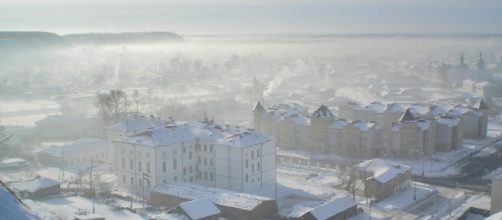Western Siberia is currently stuck in a mini Ice Age as temperatures plummeted to nearly -80 degrees Fahrenheit, breaking all previous cold records. And meteorologists say that even icier weather is coming. Temps tumbled to -62 degrees Celsius (-79.6°F) at the Bolshoe Olkhovskoe oilfield in the Khanti-Mansi region this week. And the Kazym village in the Beloyarsky district showed a biting -58 degrees C (-72.4°F).
In the province of Nadym, the bone-shattering cold pushed past the -50 degrees C (-58°F) mark, forcing schools to shut down. In provinces like Yakutia, schools stayed open despite a bone-chilling -52 degrees C (-61.6°F).
While these arctic temperatures are commonplace in eastern Siberia, it rarely gets this frigid in the west.
Check out these extreme cold photos from Surgut, Russia yesterday morning (December 21)! -58 °C reading on the thermometer! pic.twitter.com/f2SJxRuyYf
— severe-weather.EU (@severeweatherEU) December 22, 2016
Life interrupted
The glacial weather has frozen vehicles' fuel lines and batteries, forcing people to take taxis. And even that wasn’t a foolproof method of getting to work because many of the cabs wouldn’t start either. With demand outpacing supply, the price of a cab ride tripled during the deep freeze.
The Nizhnevartovsk airport had to cancel some flights because of frigid conditions, and commuter buses were taken offline.
Police issued warnings that drivers should stay at home and not attempt any long-distance or local trips. In Surgut and Shanty-Mansiysk, flights were also cancelled or delayed.
بلغت صباح اليوم 21 ديسمبر 2016 درجة الحرارة -58 درجة مئوية تحت الصفر في "سورغوت" بروسيا #Сургут#Surgut #Russia pic.twitter.com/URR2T3Eq8z
— القبة السماوية (@ShjPlanetarium) December 21, 2016
Some like it cold
While folks in the U.S. complain about polar vortexes, locals have a different take on the frigid environment: learn to like it. One woman was seen bicycling at -43-degree C (-45.4°F). Hardier locals took to deep diving into ice holes in Urai and Nizhnevartovsk, and others were seen pouring cold water over themselves.
Throughout western Siberia people were posting videos on YouTube and social media showing just how cold it had gotten. Another recorded what happens when you throw hot water into the freezing air:
Boiling water freezing instantly in temperatures below -50 °C this morning in Surgut, Russia pic.twitter.com/Paw9XtyeAW
— severe-weather.EU (@severeweatherEU) December 21, 2016
Animals taking refuge
The gelid weather also gave locals the opportunity to post some remarkable pictures to social media. Some photos showed normally cold-resistant animals taking refuge from the bitter cold.
A concerned local brought a horse into an apartment to prevent frost bite. Even reindeer, who are used to the frigid cold of the North Pole, found the subzero temperatures uncomfortable.
One reindeer took refuge inside an apartment building’s stairwell, though it’s unclear if the antlered buck was Dasher, Dancer, Prancer, Vixen, Comet, Cupid, Donner or Blitzen. With Christmas around the corner, he may want to get moving.
Le dipôle d'anomalie de températures sera extrême demain : 0°C au pôle (anomalie +25°C) et -50°C en Sibérie (anomalie -30°C). #Arctique pic.twitter.com/XVf7Hs24nZ
— Keraunos (@KeraunosObs) December 21, 2016
Weather or worse?
What's behind the record cold snap? A high-pressure system has settled over the North Pole, which is pushing Arctic air further south than normal. While some in the media are quick to blame climate change, it's actually just weather. When the polar jet stream dips down far enough, it can bring record-breaking temps to otherwise moderate areas. According to the “Siberian Times,” this was not the week when there was any evidence of global warming occurring in western Siberia.

